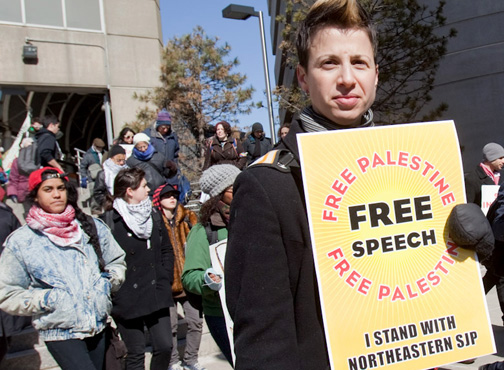Originally published by Ma’an News Agency on March 16, 2014.
A pro-Palestinian student group at a university in Boston was banned last week in what student leaders are calling a politically motivated attack on their free speech.
The suspension of the Northeastern University Students for Justice in Palestine came only days after students affiliated with the group distributed mock “eviction notices” in students’ dormitories with information about Israeli practices of Palestinian home demolitions.
“We are being sanctioned for exercising our speech rights,” student leader Max Geller told Ma’an by email on Friday.”
Flyers from all sorts of groups are routinely placed around the school without mention from administrators, let alone a full on police investigation including home visits and interrogations,” he said, stressing what he termed “viewpoint discrimination” against the campus’ only pro-Palestinian organization.
Last week, students received words that the group would be suspended for the rest of the year, and current leaders would be banned from future leadership roles.
Additionally, two students have had administrative procedures launched against them by the administration, with the possibility of suspension from the university.
University officials said in a statement emailed to Ma’an on Friday that the proceedings are about “holding every member of our community to the same standards.”
“Despite repeated efforts by university officials to work with the leadership of SJP, the organization has repeatedly shown a disregard for university policies over an extended period of time,” the statement said.
Student leaders, however, are not convinced.While the suspension notice listed a number of administrative guidelines that students had failed to uphold — like distributing unapproved flyers, placing stickers on university property, and not properly scheduling events — students point out other groups regularly engage in similar infractions without such serious consequences.”
Guidelines on flyer distribution in dormitories are flouted, if not flatly ignored, by other student groups, as well as individuals on a regular basis,” a statement released by the group on Monday read.
“This letter says our suspension is about holding all members to the same standard, then why does the university keep treating us so different?”

‘Police ‘harassment’
SJP members complain that their suspension has also been accompanied by police “harassment,” pointing out that police have called group members’ private telephones and made unannounced visits to student homes.
Neither university officials nor the Northeastern University police department responded to inquiries regarding police involvement in the investigation, nor would they comment on whether police had been involved in past investigations of student group misconduct.
But a statement released by the university chapter of the national Jewish organization Hillel on its website on Feb. 26 — which appears to have been removed — says that the organization prompted the university administration to work with campus police to launch an investigation following the distribution of the mock “eviction notices.”
Hillel’s pressure on the administration to target SJP — and its apparent support for police involvement in an investigation against students for passing out flyers — sets a potentially troubling precedent of institutional support in a crackdown on Palestine solidarity activist groups on US university campuses, student leaders said.
“It is completely inappropriate for the administration to take its cues or even be influenced by a right wing private entity,” Geller told Ma’an in an email interview on Sunday, highlighting that although Hillel claims to be a center for all Jewish students, it currently bans anti-Zionist events while actively promoting Zionist causes.
“I find it deeply troubling that an organization which presumes Jews to be monolithic in their feelings towards Israel and moreover one that regards criticism towards Israel and the BDS movement (which my group advocates for on campus) as antisemitic would be in position to influence my school’s official position,” he added.
The “intimidating” measures taken by university police with the support of the administration have taken members by surprise as well, as investigations into student groups’ failures to abide by academic guidelines rarely lead to targeting of individual students by police.”
SJP contends all participants in mock eviction action participated equally. Why are only two members being charged?” Geller said, denouncing the selective targeting and isolation of group members by administration.
Additionally, SJP members allege that so far the only students who have received police visits and harassment have had Muslim backgrounds, despite the group’s diverse membership.
Student leaders believe that these factors suggest more than just breaches of the academic code are on trial. The unprecedented step of banning them and launching police investigations, they say, smacks of a political witch hunt.
“Why are these policies only enforced when it comes to SJP? What else could explain the police being deployed to investigate a policy violation they’ve never investigated before?” Geller said.
In an appeal to university administration against the suspension released to Ma’an, students expressed their fears that the targeting of the group portends a wider crackdown on free speech on controversial issues on campus.
“The banning of SJP represents a draconian repression of our speech rights and implicates the University’s commitment to academic freedom,” the statement said.
Despite recent victories for the boycott of Israel in United States academia, the banning of Northeastern SJP is a potent reminder of the challenges facing pro-Palestinian activists in a still overwhelmingly pro-Israel country.
